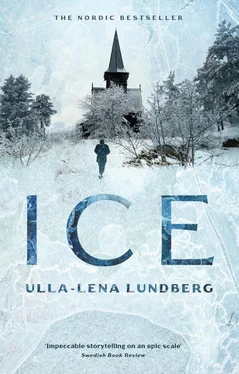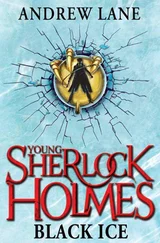But Sanna has no way to leave her own life. She’s in it all the time, and she’s afraid. Although she and Cecilia came from the parsonage, she can’t know for certain that it will still be there when she gets back, for the path is different from when they were together, goes uphill where before it went down, zigs where it used to zag. She works herself up so badly she forgets to cry, and then the parsonage is there, oddly crimson in the twilight with white trim that seems to sail out ahead of the red. She stops and starts buttoning her sweater, otherwise Mama will scold her and tell her it’s her own fault if she catches cold. It’s hard. The cardigan is tight and there are lots of buttons and buttonholes and they’re small and she can hardly see the top ones at all. She furrows her brow and squints and has to do it all over again from the beginning when it doesn’t come out even. Maybe Mama will come out on the steps and say, “Come, Sanna,” but the house is completely quiet as if no one lived there. She goes up the steps and pulls hard on the door to get it open. It’s dark in the hallway and she stumbles over a box and hurts herself. Then Mama comes out the kitchen door. “So there you are!” Behind her, Lillus has been crying but hops with joy now that Sanna has come back. It’s like Mama says to everyone—how fortunate that Lillus has Sanna.

It’s unexpectedly difficult to get the cow aboard. I’ve seldom seen such a bewildered beast. She’s lost her leader cow and has no idea what to do, throws her head about and bawls and foams at the mouth and can’t stand still when we finally get her tied up. She’s on her way to Åbo, where they’ll force her into a truck and drive her someplace near Helsingfors. There they’ll lead her into a cow barn with ten gigantic Ayrshire cows she’ll have to live with. The concentrated feed and ensilage they’ll give her will be way too rich and you don’t have to be a dairyman to realize how much gas that will produce, and what godawful diarrhoea. She may get through her first calving, but then she’ll get milk fever and be slaughtered. Better if she’d been sent to slaughter right away, with Apple. Poor, pathetic parsonage cow.
The widow doesn’t want to give her up, she’s all she has left of everything that flourished on Church Isle. Well, the children of course, but they’re as bewildered as the cow and just as scared. A perfect disaster now that they’re on their way. She made it known that she didn’t want a farewell committee, so it’s only the verger and Brage who are there to carry crates and furniture and help Kalle and me get it all stowed. She’s in a terrible rush. It all has to go quickly, and she runs back and forth directing the loading and the little girls run after her, crying. She screams at them, tells them to stay where they are and just wait, she’ll be right back. “Quiet, Lillus!” she commands, and the girls stand deathly silent on the dock while she runs up to the parsonage one last time.
I don’t know but what somewhere deep inside she still imagines that everything will be all right. That she’ll open the door and see him standing there in his everyday clothes, happy, wondering where she’s off to in such a hurry. That all the rest of it has been a long illness, bouts of heavy fever with restless nightmares. Now finally over. In any case, something drives her up to the house one final time.
In the hall, she collides with the Portmans, who have come down a little too soon, they can’t wait to take possession of the house. “Oh, excuse me!” she cries, “I was just going to … ” She has already said goodbye to them and runs past them into the parlour, nothing, the bedroom, empty, as if they’d never, hurries on, dining room, kitchen a final survey, got everything, back down the steps, no glance towards the churchyard where the grave is groomed and the rosebush blooms, back down to the church dock. There we wait, loaded. The men in the machine room as usual, in the saloon, several women on their way to Åbo, Brage and the verger at a loss on the dock.
The cow moos on deck and the widow Kummel comes running down the hill. She shoves Sanna on board, the little one is lifted across the railing. “Hold tight,” she calls, and they hold on as tight as they can. And when I say to Kalle, “Okay, then we’re off,” they hold on for dear life. He pulls in the gangplank and closes the grating. The verger stands by the rail. Maybe he was more attached to her than anyone else, and he has the most to lose by the change in priests. She can’t ignore him. He says, “Mona! I won’t say goodbye … ”
“No!” she says. “We’ve done that.” She sounds angry and remote, but he goes on.
“I’ll say ‘Until we meet again!’” He covers his large honest face with the whole sleeve of his coat, and she, small, the tip of her nose white, says, “Good!” She sweeps the girls with her down into the saloon, and when she decides, no one dares grumble. There will be no teary-eyed looks at the church and the parsonage and the sea and the land. The saloon is under the deck, and from there you can see nothing unless you press your nose against the portholes, which I must admit have never been washed.
Once the engine is going, you can’t hear a thing, and when you can’t hear, it’s harder to see. I can’t even say if the verger and Brage waved or just stood there. The women told me that the widow greeted everyone and was careful not to look out. The girls were as quiet as mice, and neither one cried.
It was a great disappointment to the women that Mrs Kummel had chosen this particular time to travel. When there are several of them, and they’ve got hours to kill, they really open up and talk away as if they were drunk or ecstatic. Anything at all, and in whatever order, and the unspoken agreement is that no one will be held responsible later for what she says in the frenzy of the moment. They talk about the living and the dead and friends and enemies, urge each other on and get obscene, laugh and interrupt, start over and exaggerate and turn themselves inside out like wartime clothing. Most of all they love scandals and horrible accidents. The worst of all is still the death of the vicar, and here sits his wife, so how can they?
Here sits his wife, and they have to talk but restrain themselves and watch what they say. The whole pleasure of the trip is gone when they have to be so careful, and although they gossip about much and many, the absence of all the other things they might have said is great and vivid. The remaining subjects are dry and the hours stretch on.
Human beings are made to live on the surface, and for long periods at a time they can forget what lies underneath. Some things sink to the bottom and other things rise up instead. What has happened in the past moves steadily away from the real world, precisely the way the priest grows more and more unlike the man he was when he walked among us, and more of a stranger. This is as it should be, for everything flows and shifts and changes. It’s the way of the world, and on the Örlands the priest is already a story, which people are happy to embroider. As long as his widow and his little girls stay put, the flow is interrupted, and depression and sorrow cling to the discussion, although new currents ought to wash them away.
There they sit, the widow feigning interest and the little girls unnaturally well-behaved. They produce a dejection among the women that feels like shame. Their sympathy has been exhausted, and people don’t like to look their own inconstancy in the mirror. On board the steamer, they get through the night sighing, and in the morning they watch as a truck backs down to the edge of the pier and the poor cow is dragged ashore and furniture and packing crates are reloaded. Goodbye, they say, with relief, as they start towards the city, goodbye and goodbye. When they’ve rounded the corner, the truck disappears from view along with the vicar’s widow and children, and when the women come back in the afternoon, the surface is clean and unruffled. It was best for everyone that they left.
Читать дальше













